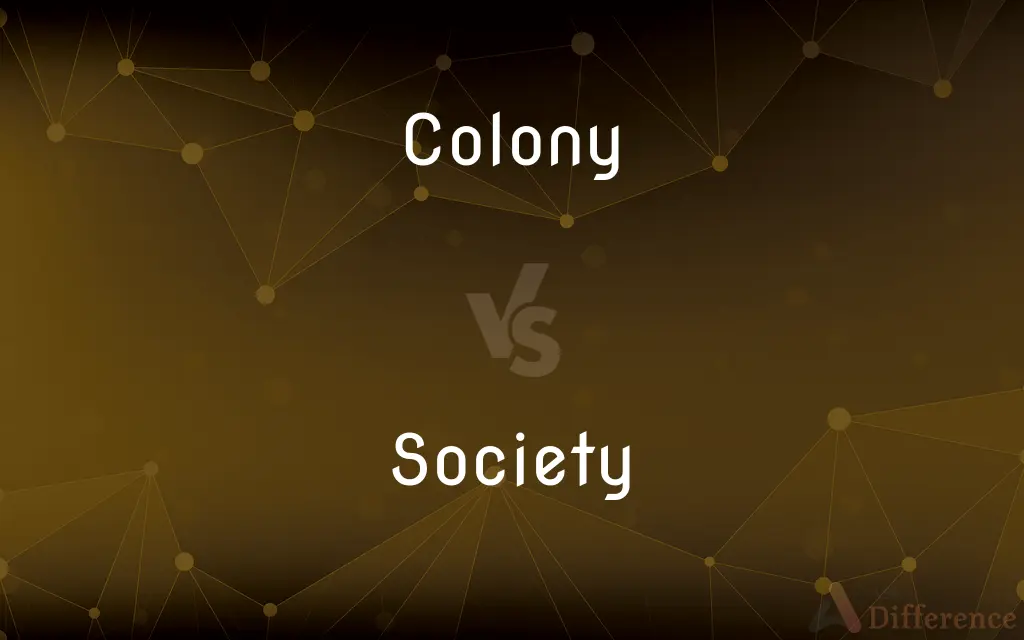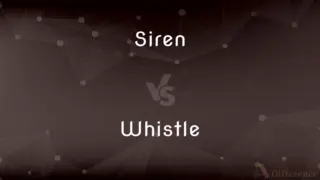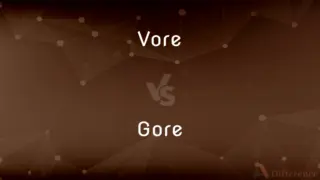Colony vs. Society — What's the Difference?
Edited by Tayyaba Rehman — By Fiza Rafique — Updated on April 27, 2024
A colony is a group living in a specific location under control or influence, often foreign; society refers to a structured community with shared customs and institutions.

Difference Between Colony and Society
Table of Contents
ADVERTISEMENT
Key Differences
A colony typically implies a group of people or animals living in a new territory under the control or influence of their home state or group, while society encompasses the organized community and social structure within a geographical region.
Colonies often form for specific purposes such as exploration, trade, or political control, whereas societies develop organically from shared customs, traditions, and governance structures.
In historical contexts, colonies were established by nations looking to expand their power and resources, on the other hand, societies evolve through complex interactions among its members, including cultural, economic, and social dimensions.
Colonization usually involves establishing a physical presence in a new territory, often leading to significant cultural and political implications for the colonized area. Conversely, a society may include a stable system of laws and social norms that guide the behavior of its members.
Colonies can be seen as extensions or outposts of a parent state or organization, aiming to benefit the controlling power, whereas a society is typically viewed as an autonomous entity with its own inherent culture and identity.
ADVERTISEMENT
Comparison Chart
Definition
A territory governed by a foreign power
An organized community with shared customs and laws
Purpose
Expansion, control, or exploitation
Social organization and mutual support
Origin
Imposed or established externally
Developed organically within a region
Political Implications
Often involves subjugation or economic dominance
Encompasses governance and social order
Cultural Identity
Linked to parent state or power
Developed from within through shared practices
Compare with Definitions
Colony
A place where a group of specific individuals are situated.
The artist's colony attracted creatives from across the country.
Society
The structured system of human organization for large-scale community living.
Every society has its own norms and laws.
Colony
A group of organisms of the same type living together.
A colony of ants can be observed in the garden.
Society
An organization or club formed for a particular purpose or activity.
The historical society organizes monthly meetings.
Colony
Territory ruled by another country.
Puerto Rico is a colony of the USA.
Society
A community of people living in an organized way.
Modern society relies heavily on technology.
Colony
A group of people sent to a foreign land to establish control.
The British established a colony in Australia.
Society
The aggregate of people living together in a more or less ordered community.
Drugs pose a big problem in our society today.
Colony
An area inhabited by a specific group for a purpose.
The penal colony was isolated from the mainland.
Society
The situation of being in the company of other people.
After months at sea, he missed society.
Colony
A territory thus settled.
Society
A society is a group of individuals involved in persistent social interaction, or a large social group sharing the same spatial or social territory, typically subject to the same political authority and dominant cultural expectations. Societies are characterized by patterns of relationships (social relations) between individuals who share a distinctive culture and institutions; a given society may be described as the sum total of such relationships among its constituent of members.
Colony
In political science, a colony is a territory subject to a form of foreign rule. Though dominated by the foreign colonizers, colonies remain separate from the administration of the original country of the colonizers, the metropolitan state (or "mother country").
Society
The aggregate of people living together in a more or less ordered community
Drugs, crime, and other dangers to society
Colony
A country or area under the full or partial political control of another country and occupied by settlers from that country
Japanese forces overran the French colony of Indo-China
Society
An organization or club formed for a particular purpose or activity
The Royal Society for the Protection of Birds
Colony
A group of people of one nationality or race living in a foreign place
The British colony in New York
Society
The situation of being in the company of other people
She shunned the society of others
Colony
A community of animals or plants of one kind living close together or forming a physically connected structure
A colony of seals
Society
The totality of people regarded as forming a community of interdependent individuals
Working for the benefit of society.
Colony
A group of emigrants or their descendants who settle in a distant territory but remain subject to or closely associated with the parent country.
Society
A group of people broadly distinguished from other groups by mutual interests, participation in characteristic relationships, shared institutions, and a common culture
Rural society.
Literary society.
Colony
A region politically controlled by a distant country; a dependency.
Society
An organization or association of persons engaged in a common profession, activity, or interest
A folklore society.
A society of bird watchers.
Colony
A group of people with the same interests or ethnic origin concentrated in a particular area
The American colony in Paris.
Society
The wealthy, socially dominant members of a community. Also called high society.
Colony
The area occupied by such a group.
Society
Companionship; company
Enjoys the society of friends and family members.
Colony
Colonies The British colonies that became the original 13 states of the United States.
Society
(Biology) A colony or community of organisms, usually of the same species
An insect society.
Colony
A group of people who have been institutionalized in a relatively remote area
An island penal colony.
Society
(countable) A long-standing group of people sharing cultural aspects such as language, dress, norms of behavior and artistic forms.
This society has been known for centuries for its colorful clothing and tight-knit family structure.
Colony
A group of the same kind of animals, plants, or one-celled organisms living or growing together.
Society
(countable) A group of people who meet from time to time to engage in a common interest; an association or organization.
It was then that they decided to found a society of didgeridoo-playing unicyclists.
Colony
A visible growth of microorganisms, usually in a solid or semisolid nutrient medium.
Society
(countable) The sum total of all voluntary interrelations between individuals.
The gap between Western and Eastern societies seems to be narrowing.
Colony
An area under the political control of another country and typically occupied by settlers (colonists) from it, or by their descendants.
Much of the eastern United States was formerly a British colony; other areas were French, Spanish, Dutch, or Swedish colonies.
Bermuda is a crown colony of Great Britain.
Society
(uncountable) The people of one’s country or community taken as a whole.
Our global society develops in fits and starts.
Colony
A group of people who settle such an area and maintain ties to their native country, and (later) their descendants.
Society
(uncountable) High society.
Smith was first introduced into society at the Duchess of Grand Fenwick's annual rose garden party.
Colony
A group of people, of one nationality, ethnic group, or language, residing in a different country, city, or area; the area such people occupy.
A colony of British expats in Spain
The Amana Colonies in Iowa were settled by people from Germany.
Society
A number of people joined by mutual consent to deliberate, determine and act toward a common goal.
Colony
A group of people with similar interests, occupations, or characteristics, living in a particular area; the area such people occupy.
A nudist colony; the statue was put up right in the middle of the artist colony
A leper colony on the outskirts of town; most buildings in the penal colony were made of concrete
Society
The relationship of men to one another when associated in any way; companionship; fellowship; company.
There is society where none intrudesBy the deep sea, and music in its roar.
Colony
(biology) A group of organisms of same or different species living together in close association.
Ant colony; coral colony
A colony of specialized polyps and medusoids
Society
Connection; participation; partnership.
The meanest of the people and such as have the least society with the acts and crimes of kings.
Colony
A group of bacteria, fungi or other cells cultured together, especially from a single cell.
Colonies of stem cells
Society
A number of persons associated for any temporary or permanent object; an association for mutual or joint usefulness, pleasure, or profit; a social union; a partnership; as, a missionary society.
Colony
(India) An apartment complex or neighborhood.
Our colony is quite small, but each apartment is large.
Society
The persons, collectively considered, who live in any region or at any period; any community of individuals who are united together by a common bond of nearness or intercourse; those who recognize each other as associates, friends, and acquaintances.
Colony
A local group of Beaver Scouts.
Society
Specifically, the more cultivated portion of any community in its social relations and influences; those who mutually give receive formal entertainments.
Colony
A potential new chapter of a fraternity or sorority awaiting official recognition from their headquarters.
Society
An extended social group having a distinctive cultural and economic organization
Colony
A company of people transplanted from their mother country to a remote province or country, and remaining subject to the jurisdiction of the parent state; as, the British colonies in America.
The first settlers of New England were the best of Englishmen, well educated, devout Christians, and zealous lovers of liberty. There was never a colony formed of better materials.
Society
A formal association of people with similar interests;
He joined a golf club
They formed a small lunch society
Men from the fraternal order will staff the soup kitchen today
Colony
The district or country colonized; a settlement.
Society
The state of being with someone;
He missed their company
He enjoyed the society of his friends
Colony
A territory subject to the ruling governmental authority of another country and not a part of the ruling country.
Society
The fashionable elite
Colony
A company of persons from the same country sojourning in a foreign city or land; as, the American colony in Paris.
Colony
A number of animals or plants living or growing together, beyond their usual range.
Colony
A cell family or group of common origin, mostly of unicellular organisms, esp. among the lower algæ. They may adhere in chains or groups, or be held together by a gelatinous envelope.
Colony
A cluster or aggregation of zooids of any compound animal, as in the corals, hydroids, certain tunicates, etc.
Colony
A community of social insects, as ants, bees, etc.
Colony
A group of microorganisms originating as the descendents of one individual cell, growing on a gelled growth medium, as of gelatin or agar; especially, such a group that has grown to a sufficient number to be visible to the naked eye.
Colony
A body of people who settle far from home but maintain ties with their homeland; inhabitants remain nationals of their home state but are not literally under the home state's system of government
Colony
A group of animals of the same type living together
Colony
One of the 13 British colonies that formed the original states of the United States
Colony
A geographical area politically controlled by a distant country
Colony
(microbiology) a group of organisms grown from a single parent cell
Common Curiosities
How does a colony differ from a society?
Colonies are typically externally governed territories, while societies are internally organized communities.
How do societies impact human behavior?
Societies shape behavior through norms, laws, and cultural expectations.
What defines a society?
A society is a structured community where individuals share customs and laws.
What is a colony?
A colony is a territory under the political control of another country.
How is social order maintained in a society?
Through laws, governance, and social norms.
Is the concept of a colony outdated?
While traditional colonialism has decreased, the influence of powerful countries over less powerful ones can be seen as a form of neocolonialism.
Why do countries establish colonies?
Countries establish colonies for economic gain, strategic advantage, or to expand their territory.
Can a colony have its own society?
Yes, over time, colonies can develop their own social structures, although they may still be under foreign control.
What role does culture play in a society?
Culture is fundamental in shaping the values, practices, and interactions within a society.
What are examples of a modern colony?
Modern examples include territories like Puerto Rico and Greenland.
What are the characteristics of a healthy society?
Inclusivity, fair laws, and effective governance are key traits.
Share Your Discovery

Previous Comparison
Siren vs. Whistle
Next Comparison
Vore vs. GoreAuthor Spotlight
Written by
Fiza RafiqueFiza Rafique is a skilled content writer at AskDifference.com, where she meticulously refines and enhances written pieces. Drawing from her vast editorial expertise, Fiza ensures clarity, accuracy, and precision in every article. Passionate about language, she continually seeks to elevate the quality of content for readers worldwide.
Edited by
Tayyaba RehmanTayyaba Rehman is a distinguished writer, currently serving as a primary contributor to askdifference.com. As a researcher in semantics and etymology, Tayyaba's passion for the complexity of languages and their distinctions has found a perfect home on the platform. Tayyaba delves into the intricacies of language, distinguishing between commonly confused words and phrases, thereby providing clarity for readers worldwide.














































